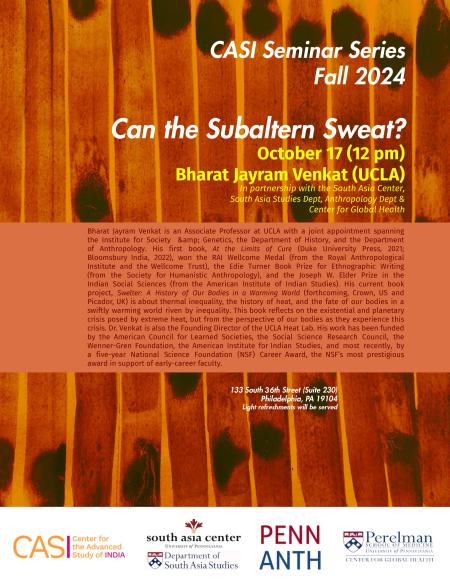Can the Subaltern Sweat?
Ronald O. Perelman Center for Political Science & Economics
133 South 36th Street, Suite 230
Philadelphia PA 19104-6215
About the Seminar:
Colonial-era systems of forced labor, ranging from indenture to outright slavery, were central to the development of contemporary understandings of human thermal physiology. The subaltern laborer’s body became a crucial site for understanding the effects of heat on different kinds of racialized bodies as a means of both maximizing labor extraction and consolidating social and political regimes organized around the perceived vulnerability and susceptibility of different kinds of bodies to heat. Focusing on thermal inequality, this seminar suggests, provides a way for rethinking subaltern studies via climate change, both historically and in the present. In a world where someone must bear the heat, divisions of both labor and laborers have become a primary means through which our collective thermal burden is unequally and unjustly allocated.
About the Speaker:Bharat Jayram Venkat is an Associate Professor at UCLA with a joint appointment spanning the Institute for Society & Genetics, the Department of History, and the Department of Anthropology. His first book, At the Limits of Cure (Duke University Press, 2021; Bloomsbury India, 2022), won the RAI Wellcome Medal (from the Royal Anthropological Institute and the Wellcome Trust), the Edie Turner Book Prize for Ethnographic Writing (from the Society for Humanistic Anthropology), and the Joseph W. Elder Prize in the Indian Social Sciences (from the American Institute of Indian Studies). His current book project, Swelter: A History of Our Bodies in a Warming World (forthcoming, Crown, US and Picador, UK) is about thermal inequality, the history of heat, and the fate of our bodies in a swiftly warming world riven by inequality. This book reflects on the existential and planetary crisis posed by extreme heat, but from the perspective of our bodies as they experience this crisis. Dr. Venkat is also the Founding Director of the UCLA Heat Lab. His work has been funded by the American Council for Learned Societies, the Social Science Research Council, the Wenner-Gren Foundation, the American Institute for Indian Studies, and most recently, by a five-year National Science Foundation (NSF) Career Award, the NSF’s most prestigious award in support of early-career faculty.

